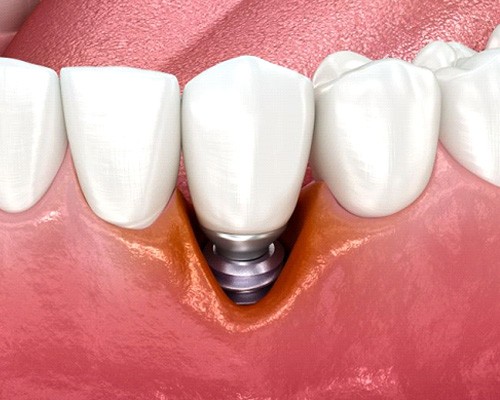Dental Implant Failure & Salvage – Bedford, TX
Save Your Restored Smile
Dental implants are successful in more than 95% of cases, so you do not need to be overly concerned that something will go wrong during your tooth replacement journey. However, it must still be acknowledged that in rare cases, dental implant failure does occur. If you ever suspect that something is not quite right with your implants, call our Bedford, TX, team to learn about our dental implant salvage services. We will do everything in our power to save your restored smile and get you back to optimum oral health ASAP.
Why Do Dental Implants Fail?

The most common reason for dental implant failure is peri-implantitis, an infection that occurs when harmful bacteria sneak into the gums and bone around an implant. The infection can become so severe that the implant loses its base of support. Often, poor oral hygiene plays a role in the development of peri-implantitis.
Other possible reasons for dental implant failure include:
- Failed osseointegration (failure of the jawbone to bond with the implant)
- Certain medical conditions, such as some types of cancer
- Injuries, such as what may be caused by an accident or severe teeth grinding and clenching
Symptoms of a Failed Dental Implant

It is important to note that dental implant failure can occur soon after the placement surgery or some time later. It can even occur decades after the initial procedure! Therefore, it is important that you monitor your oral health and seek care at the first sign of a problem.
Here are some symptoms that you should be on the lookout for:
- After you heal from your implant surgery, your mouth should be pain-free. Severe or unusual pain is a big red flag.
- Signs of infection. Pus, swelling, and gum recession are all potential signs of peri-implantitis.
- An implant feels loose. This could be a problem with the implant itself or with the restoration on top of it.
- Difficulty eating. After you adapt to using your implants, it should be easy for you to eat virtually any food. Challenges in this area warrant a call to our dental office.
How Dental Implant Salvage Works

You should schedule an appointment as soon as you believe that something is amiss with your dental implants. The sooner you receive care, the more likely it is that we can address the situation via conservative means.
During your visit, we will examine your mouth and learn about your symptoms before we recommend a treatment. You might need something simple, such as a new restoration, a course of antibiotics, or some tips on how to improve your oral hygiene routine. However, if the situation is severe, we might need to completely remove your failing implant. Later, after a healing period and a possible bone graft, you may be eligible for a new implant.

